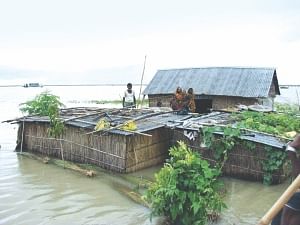| Home - Back Issues - The Team - Contact Us |
 |
| Volume 10 |Issue 46 | December 09, 2011 | |
|
|
Environment Gloomy Outlook in Durban MARTIN KHOR The two-week UN Climate Conference taking place in Durban is at mid-point and its prospect for success is not looking bright. The political leaders arrive this week to confront a range of problematic issues. It is likely that compromises will be worked out and a few successes will be claimed, but the reality is that they won't be enough to tackle the worsening climate situation on the ground.
The hottest topic is the fate of the Kyoto Protocol. Global Trends broke the news in October 2009 on how rich nations were plotting to get rid of this protocol. Since then, Japan, Canada and Russia have announced they do not want to undertake a second period of commitment when the first period expires next year. The developing countries have been fighting for the protocol's survival and vowed that Durban shall not be the protocol's burial ground. All developed countries except the United States commit to reduce their emissions by a certain percentage under this protocol. In last week's talks, the European Union came up with some ideas to keep Kyoto just about alive, through a decision or a declaration, rather than what it should be – an amendment of the protocol to reflect emission reduction targets for a new period from 2013. But even for this, the EU wants to extract a huge concession, that all "major economies” agree to start negotiations for a new legally binding treaty that will take effect in 2020. The United States is not keen at all on having its emissions targets bound in any treaty. It left the Kyoto Protocol years ago, and its Congress is unlikely to agree to join any new climate treaty. The US says it can join a new treaty but sets the impossible condition that major developing countries also take on similar emission-reduction commitments as the developed nations. It is "major” as an economy or emitter because of its large population (1.2 billion) for which it can hardly be blamed. To ask India to take on the same obligations as developed countries with more than 30 times higher per capita income and over ten times higher per capita emissions is simply unfair. Thus, it is unsurprising that developing countries like China, India and Brazil are not prepared to bow to pressure to take on rich-country commitments as a condition for the really rich countries to maintain their present commitments. How this story of Kyoto's sad fate will end is to be seen. A quick death is now unlikely, given the protests it will generate and the bad name this will give the perpetrators. Putting it on life support is the alternative. In Durban's first week, the developed countries continued their attempt to shift the burden of cutting global emissions on to developing countries. The original agreed idea, that all developed counties would collectively cut their emissions by a target (the numbers being negotiated were 25 per cent -40 per cent, or over 40 percent by 2020 ) and that each would make a comparable effort with the others, is all but gone, not even mentioned in draft conclusions of the conference released on December 3. It has been replaced by a voluntary pledge system. But there are numerous pages on how developing countries will undertake new obligations for reporting on and monitoring their emissions and their actions, and being subject to international review. The Durban conference is also debating how to operationalise a new green climate fund. Disputes remain on the fund's governance. If there is agreement, it may be Durban's visible success. However, many are worried it will be a rather empty structure at first, as funding from developed countries is getting scarcer with the impending economic recession. Three other key issues such as equity in sharing sustainable development space, the intellectual property-technology transfer link, and dangers of unilateral trade measures also figure in Durban. They had been central to the discussion before, but last year's conference in Cancun marginalised these issues. It is a sign of how badly the talks have gone that many developing countries led by India are now doing major battle just to ensure they are back on the agenda. Copyright
(R) thedailystar.net 2011 |
